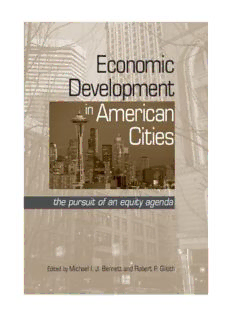
Economic Development in American Cities: The Pursuit of an Equity Agenda PDF
Preview Economic Development in American Cities: The Pursuit of an Equity Agenda
Economic Development in American Cities the pursuit of an equity agenda Edited by Michael I. J. Bennett and Robert P. Giloth ECONOMIC DEVELOPMENT IN AMERICAN CITIES SUNY SERIES IN URBAN PUBLIC POLICY C. Theodore Koebel and Diane L. Zahm, editors ECONOMIC DEVELOPMENT IN AMERICAN CITIES The Pursuit of an Equity Agenda Edited by Michael I. J. Bennett Robert P. Giloth State University of New York Press Published by STATE UNIVERSITY OF NEW YORK PRESS, Albany © 2007 State University of New York All rights reserved Printed in the United States of America No part of this book may be used or reproduced in any manner whatsoever without written permission. No part of this book may be stored in a retrieval system or transmitted in any form or by any means including electronic, electrostatic, magnetic tape, mechanical, photocopying, recording, or otherwise without the prior permission in writing of the publisher. For information, contact State University of New York Press, Albany, NY www.sunypress.edu Production, Laurie Searl Marketing, Michael Campochiaro Library of Congress Cataloging-in-Publication Data Economic development in American cities : the pursuit of an equity agenda / edited by Michael I. J. Bennett, Robert P. Giloth. p. cm. — (SUNY series, Studies in urban public policy) Includes bibliographical references and index. ISBN-13: 978-0-7914-7133-3 (hardcover : alk. paper) 1. Cities and towns—United States. 2. Urban policy—United States—Case studies. 3. Urban economics. 4. Sociology, Urban—United States. I. Bennett, Michael I. J., 1944– II. Giloth, Robert. HT123.E284 2007 307.760973—dc22 2006032531 10 9 8 7 6 5 4 3 2 1 CONTENTS Acknowledgments vii Introduction: Full Employment and Local Workforce Politics and Policies 1 Robert P. Giloth Chapter 1 Investing in Equity: Targeted Economic Development for Neighborhoods and Cities 23 Robert P. Giloth Chapter 2 Equity Policies and Practices of the Harold Washington Administration: Lessons for Progressive Cities 51 Stephen J. Alexander Chapter 3 Reflections on Austin in the 1990s: Economic Development through Workforce Initiatives 81 Robert W. Glover, Dan O’Shea, and Christopher T. King Chapter 4 Seattle’s Best Practices in the 1990s: Municipal-Led Economic and Workforce Development 111 Bob Watrus and Jodi Haavig Chapter 5 The Cleveland Experience: Municipal-Led Economic and Workforce Initiatives during the 1990s 133 Norman Krumholz and Daniel E. Berry Chapter 6 Rochester: Two Faces of Regionalism, 1993–2006 159 Pierre Clavel CONTENTS vi Chapter 7 The Savannah Story: The Road to Equity and Sustainable Community Development 189 Henry Moore and Christopher Morrill Chapter 8 Social Equity and Twenty-First Century Cities 213 Michael I. J. Bennett and Robert P. Giloth Contributors 237 Index 243 ACKNOWLEDGMENTS vii ACKNOWLEDGMENTS This book was inspired by the vision and commitment of the late Chicago Mayor Harold Washington and his administrative team. Their efforts in forging an equity agenda during the 1980s served as a model for progressive municipal government leaders throughout the country in that era and the decade to follow. The book would not have come to be without the partici- pation of the Annie E. Casey Foundation. The Foundation provided a series of generous grants to underwrite the research and compilation of the case studies and the final manuscript. We also want to thank the following individuals: former U.S. Secretary of Labor Ray Marshall and former Mayor Bruce Todd for their general and specific contributions in shaping the Austin case; Marie Ann Sliwinski and Bijan Warner for their valuable research assistance; and Linda Levendusky, Sarah Korhonen, Ed Hatcher, Tom Waldron, Helena Teklehaimanot, and Noah Temaner Jenkins for their crucial editing of the manuscript. Each author who crafted the substantive material that became this book deserves special recognition for both their written contributions and their camaraderie throughout the entire project. We owe an additional note of gratitude to Pierre Clavel for reviewing and providing working feedback on the manuscript. Finally, there is Henry Moore, our friend and colleague who passed away prior to publication. Beyond his written contribution to this book, Henry led a life that exemplified the monumental impact one progressive municipal administrator could have in the pursuit of an equity agenda. He will be greatly missed. vii INTRODUCTION FULL EMPLOYMENT AND LOCAL WORKFORCE POLITICS AND POLICIES Robert P. Giloth ECONOMIC DEVELOPMENT AND EQUITY Twentieth-century U.S. cities played decisive roles in promoting equity and opportunity for their citizens. Cities were the sources of important municipal innovations as well as the social, political, and economic battlegrounds for advancing more equitable policies and conditions. The reaffirmation and extension of civil rights, the development of a social safety net, and sus- tained economic growth made cities and metropolitan areas the laboratories for creating more diverse, tolerant, and equitable communities. Nevertheless, income inequality has grown in the United States by at least 12 percent, income gains and employment still lag for African American young men, and the Hurricane Katrina evacuation and aftermath have vividly shown the impact of social, economic, and racial disparities on our basic security and quality of life. Economic Development in American Cities: The Pursuit of an Equity Agenda anticipates the roles of municipal leaders and civic partners for promoting social equity in the twenty-first century by examining the experiences of a handful of cities in the 1990s. In particular, we reflect on the potential of existing and future labor and skill shortages for contributing to creating the preconditions for new local political regimes built around economic competi- tiveness and equity. That is, we are interested in whether the economic im- peratives of tight regional labor markets translate into new civic organizing 1
Description: